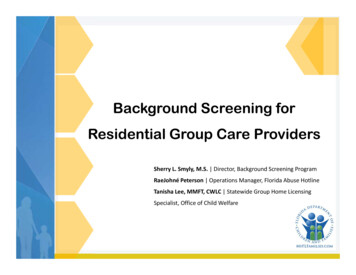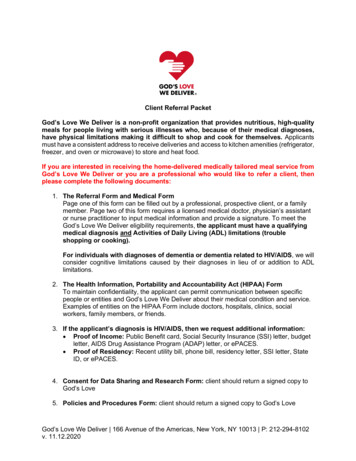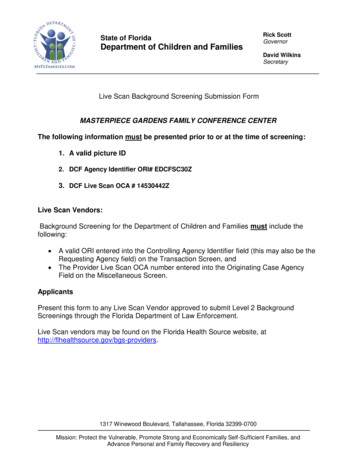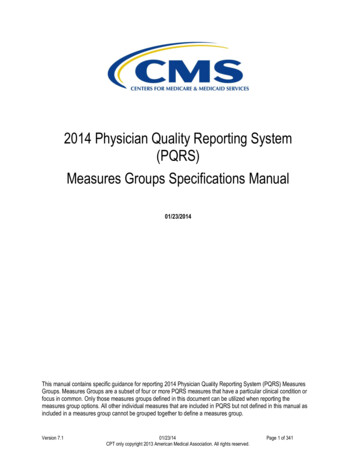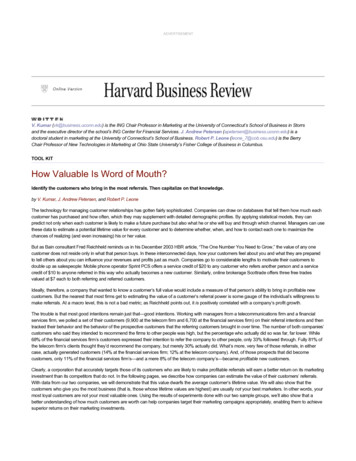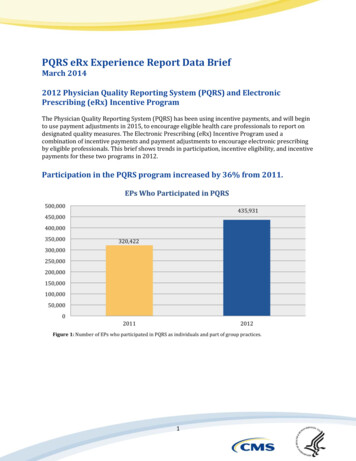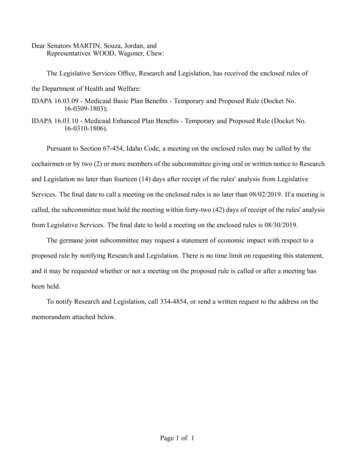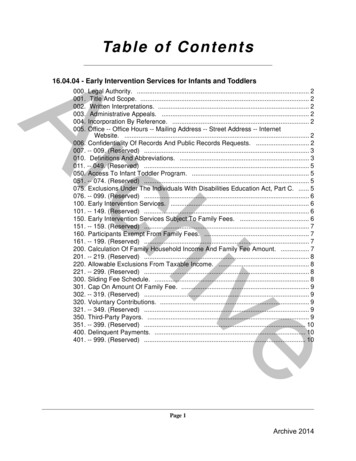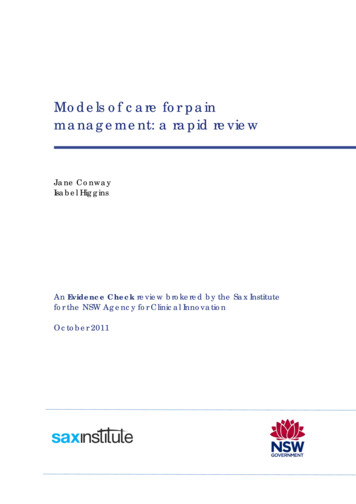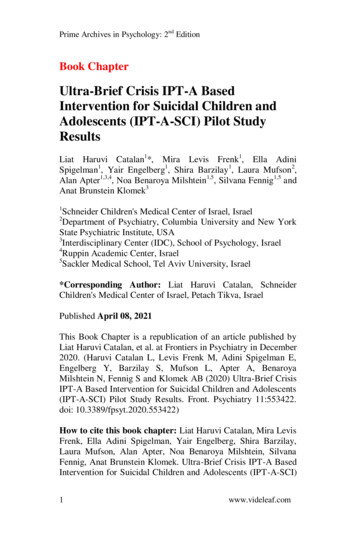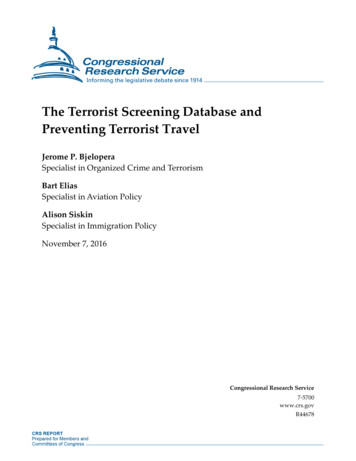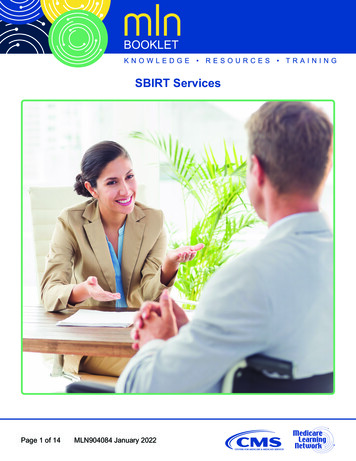
Transcription
SBIRT ServicesPage 1 of 14MLN904084 January 2022
SBIRT ServicesMLN BookletTable of ContentsWhat’s Changed? . 3What’s SBIRT? . 4Medicare SBIRT . 6Medicare-Eligible Providers . 6Medicare-Covered SBIRT Services . 8Documenting Medicare SBIRT Services . 8Billing Medicare SBIRT Services . 9Medicare SBIRT Codes & Descriptors . 9Substance Use Disorder Bundled Physician Fee Schedule Payments . 9Opioid Use Disorder: Part D Treatment Drugs . 10Opioid Treatment Programs .11Medicaid SBIRT . 12Documenting Medicaid SBIRT Services . 12Billing Medicaid SBIRT Services . 13Dually Eligible Medicare-Medicaid Beneficiaries . 14Resources . 14Page 2 of 14MLN904084 January 2022
SBIRT ServicesMLN BookletWhat’s Changed? Beginning January 1, 2022, we cover Naloxone HCPCS Code G1028 (page 11)You’ll find substantive content updates in dark red font.Page 3 of 14MLN904084 January 2022
SBIRT ServicesMLN BookletThis Screening, Brief Intervention, & Referral toTreatment (SBIRT) booklet provides Medicare andMedicaid SBIRT services coverage information: Eligible providers Covered SBIRT services Documenting SBIRT services Billing SBIRT services Dually eligible Medicare-Medicaid beneficiariesTogether we can advance health equityand help eliminate health disparities forall minority and underserved groups.Find resources and more from theCMS Office of Minority Health: Health Equity TechnicalAssistance Program Disparities Impact StatementNote: We cover Alcohol Misuse Screening andCounseling (preventive screening once per year for adultswho use alcohol but don’t meet dependency criteria; if youThroughout this booklet,detect misuse, we cover up to 4 brief face-to-face counselingwe refers to Medicare.sessions per year if the patient is alert and competent duringthem). We also cover Medicare Wellness Visits. These visitsinclude a review of your medical and social history related to your health and education andcounseling about preventive services, including Substance Use Disorder (SUD) screenings,current opioid prescriptions review, and referrals to treatment as appropriate.Different requirements apply to Medicare and Medicaid. Medicare & Medicaid Basics fact sheetexplores the differences.We also cover several mental health services. Medicare Mental Health booklet has more informationon qualifications, coverage, and payment guidelines.What’s SBIRT?SBIRT is an evidence-based, early intervention approach for people with non-dependent substanceuse before they need more extensive or specialized treatment. This approach differs from specializedtreatment for those with more severe substance misuse or a SUD.SBIRT BenefitsUsing SBIRT services is easy in primary care settings. You can systematically screen people who maynot seek substance use help and offer SBIRT treatment services access to: Reduce health care costs Decrease drug and alcohol use severity Reduce physical trauma risk Reduce patient-percentage who go without specialized treatmentPage 4 of 14MLN904084 January 2022
SBIRT ServicesMLN BookletSBIRT has 3 major components:123Screening:Screen or assess a patient for risky substance use behaviors withstandardized assessment tools to identify the appropriate level of care(known as Medicare Structured Assessment). Screening quickly assessesthe substance use severity and identifies the appropriate treatment level.Brief Intervention:Brief intervention increases substance use insight and awareness andmotivates behavioral change. Engage the patient in a short conversationto increase their awareness of risky substance use behaviors and providefeedback, motivation, and advice. We cover 1 preventive screening per yearand up to 4 brief face-to-face counseling sessions per year at no cost tothe patient.Referral to Treatment:Refer patients whose assessment or screening shows a need for additionalservices to brief therapy or specialty care treatment.SBIRT Assessment & Screening ToolsThe first SBIRT element is assessment or screening. You may use tools including the WorldHealth Organization’s Alcohol Use Disorders Identification Test (AUDIT) Manual and the DrugAbuse Screening Test (DAST). Substance Abuse and Mental Health Services Administration(SAMHSA) Resources for SBIRT has more SBIRT assessment and screening tools information.Substance Use Disorders: The Diagnostic and Statistical Manual of Mental Disorders, FifthEdition (DSM-5) no longer uses the terms substance abuse and substance dependence. Instead,it refers to “Substance Use Disorders” (SUDs), classified as mild, moderate, or severe. The numberof diagnostic criteria an individual meets determines their severity level. SAMHSA’s Mental Healthand SUDs webpage has common SUD facts. SAMHSA’s Behavioral Health Treatment Locatorcan help you find mental health treatment facilities and programs around the country.Page 5 of 14MLN904084 January 2022
SBIRT ServicesMLN BookletMedicare SBIRTMedicare-Eligible ProvidersWe pay medically reasonable and necessary SBIRT services in physicians’ offices and outpatient hospitalsettings. In these settings, you assess and identify people with, or at risk for, substance use-relatedissues and provide limited interventions or treatment. We have specific, authorized SBIRTsupplier qualifications.Eligible SBIRT Services Health Care SuppliersProvider Type &ReferencePhysicians (MedicalDoctors [MDs] andDoctors of Osteopathy[DOs]), particularlypsychiatristsQualifications Legally authorized to practice medicine in the state where youprovide services Perform services within the scope of your licenses, as defined bystate law42 CFR 410.20Section 30 of MedicareBenefit Policy Manual,Chapter 15Physician Assistant (PA) Licensed by the state where you practice and 1 of these criteria:42 CFR 410.74 Section 190 of MedicareBenefit Policy Manual,Chapter 15Graduated from a PA educational program accredited by theAccreditation Review Commission on Education for the PhysicianAssistant (or its predecessor agencies, the Commission onAccreditation of Allied Health Education Programs, andCommittee on Allied Health Education and Accreditation)Passed the National Commission on Certification of PhysicianAssistants exam Registered Nurse (RN) licensed and authorized by the state whereyou provide NP services according to state law Got Medicare NP billing privileges for the first time since January 1,2003, and: Nurse Practitioner (NP)42 CFR 410.75Section 200 of MedicareBenefit Policy Manual,Chapter 15 NP certified by a recognized national certifying body withestablished NP standards Master’s degree in nursing or a Doctor of Nursing Practice degree Got Medicare NP billing privileges for first time before January 1, 2003,and meets certification requirements Got Medicare NP billing privileges for first time before January 1, 2001Page 6 of 14MLN904084 January 2022
SBIRT ServicesMLN BookletEligible SBIRT Services Health Care Suppliers (cont.)Provider Type &ReferenceClinical Nurse Specialist(CNS)42 CFR 410.76Section 210 of MedicareBenefit Policy Manual,Chapter 15Qualifications RN currently licensed in the state where you practice andauthorized to provide CNS services according to state law Doctor of Nursing Practice or master’s degree in a defined clinicalnursing area from an accredited educational institution Certified as a CNS by a recognized national certifying body withestablished CNS standardsClinical Psychologist (CP) Psychology doctoral degree Licensed or certified in the state where you practice at the42 CFR 410.71independent level and directly provide diagnostic, assessment,Section 160 of Medicarepreventive, and therapeutic patient servicesBenefit Policy Manual,Chapter 15Clinical Social Worker(CSW)42 CFR 410.73 Social Work master’s or doctoral degree At least 2 years supervised clinical social work Licensed or certified CSW by the state where you provide servicesSection 170 of Medicare If you practice in a state that doesn’t have licensure or certification,Benefit Policy Manual,and complete at least 2 years or 3,000 supervised social workChapter 15practice clinical hours, post-master’s degree in an appropriatesetting (for example hospital, Skilled Nursing Facility [SNF], or clinic)Certified Nurse-Midwife RN legally authorized to practice as a nurse-midwife in the state(CNM)where you provide services Successfully completed a nurse-midwives program of study and42 CFR 410.77clinical experience accredited by an accrediting body the U.S.Section 180 of MedicareDepartment of Education approvedBenefit Policy Manual, Certified as a nurse-midwife by the American College of NurseChapter 15Midwives or the American College of Nurse-Midwives CertificationCouncilIndependently Practicing Psychologist who isn’t a CPPsychologist (IPP) Meets 1 of these criteria:Section 80.2 of MedicareBenefit Policy Manual,Chapter 15Page 7 of 14 Practices independent of an institution, agency, or physician’soffice and licensed or certified to practice psychology in the stateor jurisdiction where you provide services Practicing psychologist who provides services in a jurisdictionthat doesn’t issue licensesMLN904084 January 2022
SBIRT ServicesMLN BookletMedicare-Covered SBIRT ServicesAccording to section 1862(a)(1)(A) of the Social Security Act, we cover reasonable and necessarySBIRT services that meet the required diagnosis or illness treatment or injury (you provide the serviceto evaluate or treat patients with signs or symptoms of illness or injury).We pay these services under the Medicare Physician Fee Schedule (PFS) and the hospital OutpatientProspective Payment System (OPPS). Section 200.6 of Medicare Claims Processing Manual, Chapter 4has more Medicare SBIRT OPPS payment services information.We currently pay for screening and brief intervention as a preventive service in the primary care setting.Documenting Medicare SBIRT ServicesThe patient’s medical record must support all Medicare claims. The SBIRT-covered services medicalrecord must: Be complete and legible Record start and stop times or total face-to-face time with the patient (some SBIRT HCPCS codesare time based) Document patient’s progress, response to treatment changes, and diagnosis revision Document rationale for ordering diagnostic and other ancillary services or ensure it’s easily inferred For each patient encounter, document: Assessment, clinical impression, and diagnosis Date and legible provider identity Physical exam findings and prior diagnostic test results Plan of care Encounter reason and relevant history Identify appropriate health risk factors Make past and present diagnoses accessible for treating and consulting physicians Have signatures for all services provided or orderedNote: Incomplete records place you at risk of partial or full Medicare payment denial.Physicians, Certified Registered Nurse Anesthetists (CRNAs), PAs, CNMs, CNSs, and NPs may reviewand verify (sign and date), rather than re-document, notes in a patient’s medical record made byphysicians; residents; nurses; medical, PA, and APRN students; or other medical team members,including, as applicable, notes documenting the physician’s, CRNA’s, PA’s, CNM’s, CNS’s, and NP’spresence and service participation.Page 8 of 14MLN904084 January 2022
SBIRT ServicesMLN BookletBilling Medicare SBIRT ServicesHCPCS CodeG2011Alcohol and/or substance (other than tobacco) misusestructured assessment (e.g., audit, dast), and brief intervention5–14 minutesHCPCS CodeG0396Alcohol and/or substance (other than tobacco) misusestructured assessment (e.g., audit, dast), and brief intervention15 to 30 minutesHCPCS CodeG0397Alcohol and/or substance (other than tobacco) misusestructured assessment (e.g., audit, dast), and intervention,greater than 30 minutesMedicare Telehealth Includes SBIRT ServicesYou can provide SBIRT services via telehealth if you meet all requirements.Substance Use Disorder Bundled Physician Fee Schedule PaymentsHCPCS CodeG2086Office-based treatment for opioid use disorder, includingdevelopment of the treatment plan, care coordination,individual therapy and group therapy and counseling; atleast 70 minutes in the first calendar monthHCPCS CodeG2087Office-based treatment for opioid use disorder, includingcare coordination, individual therapy and group therapyand counseling; at least 60 minutes in a subsequentcalendar monthHCPCS CodeG2088Office-based treatment for opioid use disorder, including carecoordination, individual therapy and group therapy andcounseling; each additional 30 minutes beyond the first 120minutes (list separately in addition to code for primary procedure)Note:Don’t bill HCPCS codes G2086–G2088 more than once per month per patient. These codesdescribe treatment for 1 or more SUDs.Page 9 of 14MLN904084 January 2022
SBIRT ServicesMLN BookletOpioid Use Disorder: Part D Treatment DrugsMedicare drug plan (Part D) sponsors must cover OUD Part D treatment drugs, when medicallynecessary, by including them on the formulary or by exception. Coverage isn’t limited to single entityproducts (for example, Buprenorphine) but must include combination products when medicallynecessary (for example, Buprenorphine Naloxone and long-acting Naltrexone).CMS sponsors must have a transition policy to prevent interruptions in Part D therapeutic treatment drugswhen new patients transition into the benefit. This transition policy, along with CMS’s non-formularyexceptions and appeals requirements, helps make sure all your patients have timely access tomedically necessary OUD Part D drug therapies.A pharmacy can dispense a Part D drug only upon prescription if the drug is helping treat a medicallyaccepted indication. Medicare Prescription Drug Benefit Manual, Chapter 6 has more information.Since January 1, 2021, you can prescribe a Medicare Part D Schedule II, III, IV, or V controlledsubstance electronically according to the electronic prescription drug program requirements.Methadone isn’t an OUD Part D drug because a retail pharmacy can’t dispense it for treatment.42 CFR 8.12(h)(2) has more FDA-authorized OUD investigational use medication information, and42 CFR 8.1 has more OUD medication-assisted treatment information.Note: Methadone is a Part D drug when indicated for pain. State Medicaid Programs may includethe methadone costs in their bundled payment to qualified Opioid Treatment Programs (OTPs)or hospitals dispensing OUD methadone. Section 10.8 of Medicare Prescription Drug BenefitManual, Chapter 6 has more information.Page 10 of 14MLN904084 January 2022
SBIRT ServicesMLN BookletOpioid Treatment ProgramsSince January 1, 2020, we pay certified OTPs Medicare Part B bundled OUD treatment servicespayments. Covered services include FDA-approved oral, injected, and implanted opioid agonist andantagonist medication-assisted treatment medications (including methadone, buprenorphine, andnaltrexone) and their administration (if applicable), substance use counseling, individual and grouptherapy, toxicology testing, intake, and periodic assessments. Opioid Treatment Programs (OTPs)Medicare Billing & Payment booklet and Opioid Treatment Program Directory have more information.There are 3 add-on codes to cover the cost of Naloxone:HCPCS CodeG2215Take-home supply of Nasal Naloxone (provision of the services by aMedicare-enrolled Opioid Treatment Program); List separately in additionto code for primary procedure. (This will include both a drug componentand a non-drug component for overdose education).HCPCS CodeG2216Take-home supply of Injectable Naloxone (provision of the services by aMedicare-enrolled Opioid Treatment Program); List separately in additionto code for primary procedure.HCPCS CodeG1028Beginning January 1, 2022, we cover HCPCS Code G1028:Take-home supply of nasal Naloxone; 2-pack of 8mg per 0.1 mL nasalspray (provision of the services by a Medicare-enrolled Opioid TreatmentProgram); List separately in addition to code for primary procedure.Note: Payment for HCPCS codes G1028, G2215, and G2216 is limited to once every 30 days unlessan additional take home supply of the medication is medically reasonable and necessary.After the conclusion of the COVID-19 Public Health Emergency (PHE), OTPs can furnish counselingand therapy services via audio-only interaction (for example, phone calls) in cases where audio andor video communication isn’t available to the patient, including circumstances in which the patient isn’tcapable of or doesn’t consent to using devices that permit a 2-way audio and or video interaction,provided all other applicable requirements are met.There’s no copayment for OTP services for people with Medicare.Page 11 of 14MLN904084 January 2022
SBIRT ServicesMLN BookletMedicaid SBIRTStates may cover SBIRT as a Medicaid state plan service. Several Medicaid statutory authorities maycover SBIRT, including, but not limited to: 42 CFR 440.50: Physicians’ services 42 CFR 440.60: Services of other licensed practitioners 42 CFR 440.130(c): Preventive services 42 CFR 440.130(d): Rehabilitative servicesSection 1905(r) of the Social Security Act states the Early and Periodic, Screening, Diagnostic, andTreatment (EPSDT) benefit provides a comprehensive selection of eligible children’s preventive,diagnostic, and treatment services if they’re under age 21. Medicaid includes this mandatory benefitto make sure children get early detection and care to treat or avoid health problems.States must arrange for children to get health screening services at regular intervals and diagnosticservices when needed. They must also provide services or items within the Medicaid-coveredbenefits listed in section 1905(a) of the Social Security Act if that service or item is necessary andcorrects or ameliorates defects and physical and mental illnesses or conditions.A physician or other licensed practitioner of healing arts, within the scope of their practice under statelaw, must recommend preventive and rehabilitative services.When state Medicaid plans cover SBIRT, the states establish which practitioners may provideservices and their qualifications. Practitioner qualifications offering SUD treatment include, but aren’tlimited to those: Licensed or certified to perform SUD services by the state where they perform the services Qualified to perform specific SUD services Supervised by a licensed practitioner of healing arts (in some instances, when a qualifiedunlicensed professional provided the services) Working within their state scope-of-practice actDocumenting Medicaid SBIRT ServicesYou must comply with the state’s Medicaid SBIRT documentation policy. You can often find thestate’s documentation policy in its Medicaid Provider Manual. Your state Medicaid agency has moredocumentation information.Page 12 of 14MLN904084 January 2022
SBIRT ServicesMLN BookletBilling Medicaid SBIRT ServicesIf a state chooses to cover SBIRT under its Medicaid Program, the state may choose which codes tobill brief intervention services; for example, HCPCS codes:HCPCS CodeG0396Alcohol and/or substance (other than tobacco) misusestructured assessment (e.g., audit, dast), and briefintervention 15 to 30 minutesHCPCS CodeG0397Alcohol and/or substance (other than tobacco) misusestructured assessment (e.g., audit, dast), and intervention,greater than 30 minutesHCPCS CodeG0442Annual alcohol misuse screening, 15 minutesHCPCS CodeG0443Brief face-to-face behavioral counseling for alcoholmisuse, 15 minutesHCPCS CodeG0444Annual depression screening, 15 minutesHCPCS CodeH0049Alcohol and/or drug screeningHCPCS CodeH0050Alcohol and/or drug services, brief intervention,per 15 minutesCheck with your state Medicaid agency about which billing codes to use.Medicaid National Correct Coding Initiative (NCCI) Policy Manual, Chapter 12, Section C(16), availablein the Medicaid NCCI Reference Documents webpage, has billing codes G0396 and G0397 withevaluation and management codes and behavioral health codes information.Medicaid Telemedicine Includes SBIRTIf the state allows it, you may provide SBIRT via telemedicine.Page 13 of 14MLN904084 January 2022
SBIRT ServicesMLN BookletDually Eligible Medicare-Medicaid BeneficiariesFor people enrolled in both Medicare and Medicaid Programs (dually eligible), Medicare-participatingproviders should bill Medicare and their Medicare Administrative Contractor (MAC) will transfer theclaim to Medicaid after paying the Medicare-approved amount. Medicare providers must enroll in theirstate Medicaid Program(s) to get paid. States must accept the claim and decide if they’ll pay the costsharing amounts.States accept claims for all Medicare-covered services for certain dual eligible beneficiaries and paycost-sharing amounts according to the state plan payment method.Note: Nominal Medicaid cost sharing may apply for certain dually eligible beneficiaries. The stateMedicaid Programs pay some cost sharing. However, you may not balance-bill dually eligiblebeneficiaries when Medicare and Medicaid payments fall below the approved Medicare rate.Beneficiaries Dually Eligible for Medicare & Medicaid fact sheet has more information.Find your MAC’s website for more information.Resources OTPs Medicare Enrollment Stopping the Misuse of Fentanyl and Other Synthetic OpioidsMedicare Learning Network Content Disclaimer, Product Disclaimer, and Department of Health & Human Services DisclosureThe Medicare Learning Network , MLN Connects , and MLN Matters are registered trademarks of the U.S. Departmentof Health & Human Services (HHS).Page 14 of 14MLN904084 January 2022
Screening Brief Intervention & Referral to Treatment (SBIRT) Services MLN Booklet Page 4 of 16 ICN MLN904084 February 2021. Introduction. Screening, Brief Intervention, & Refer
